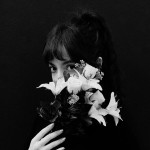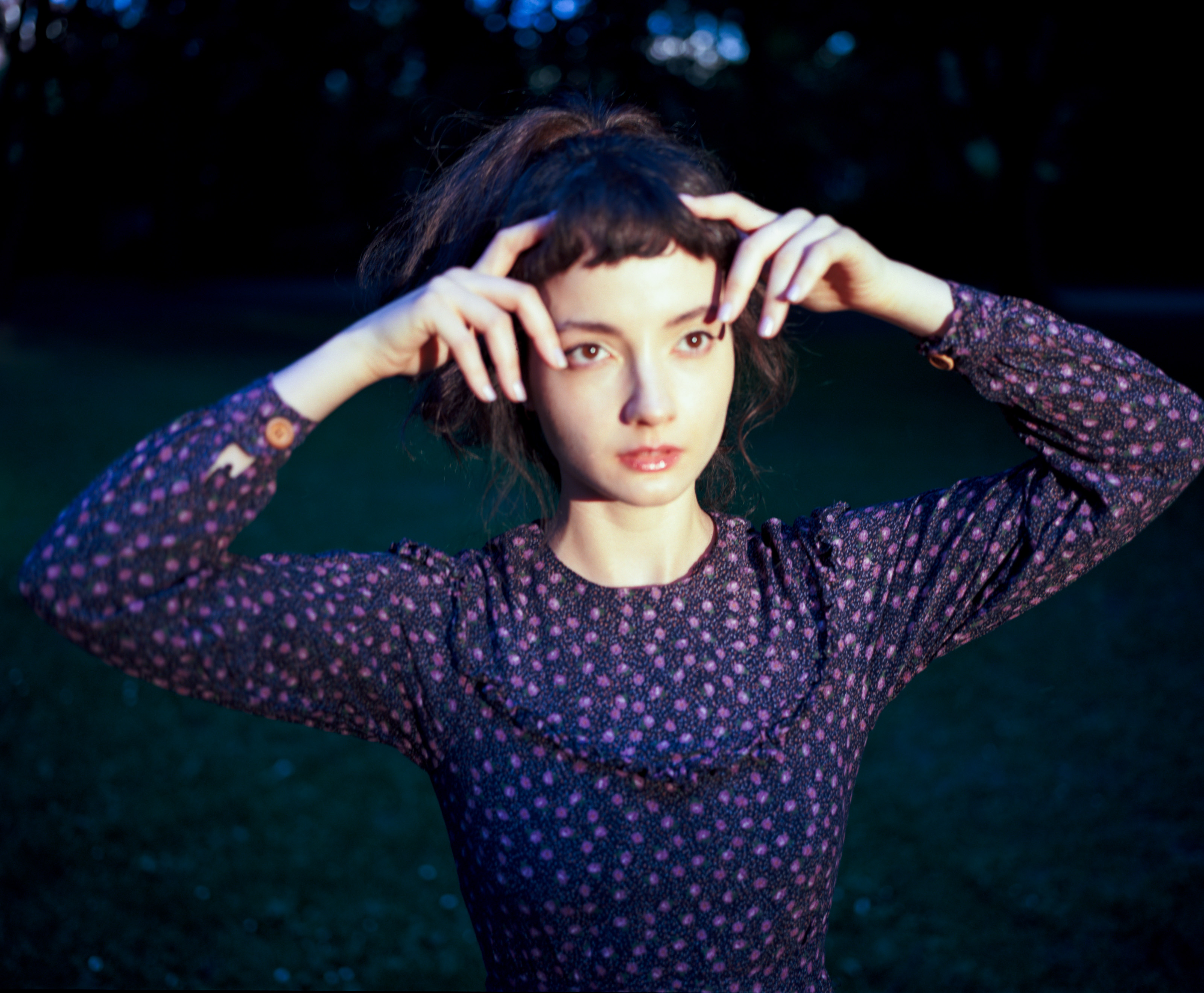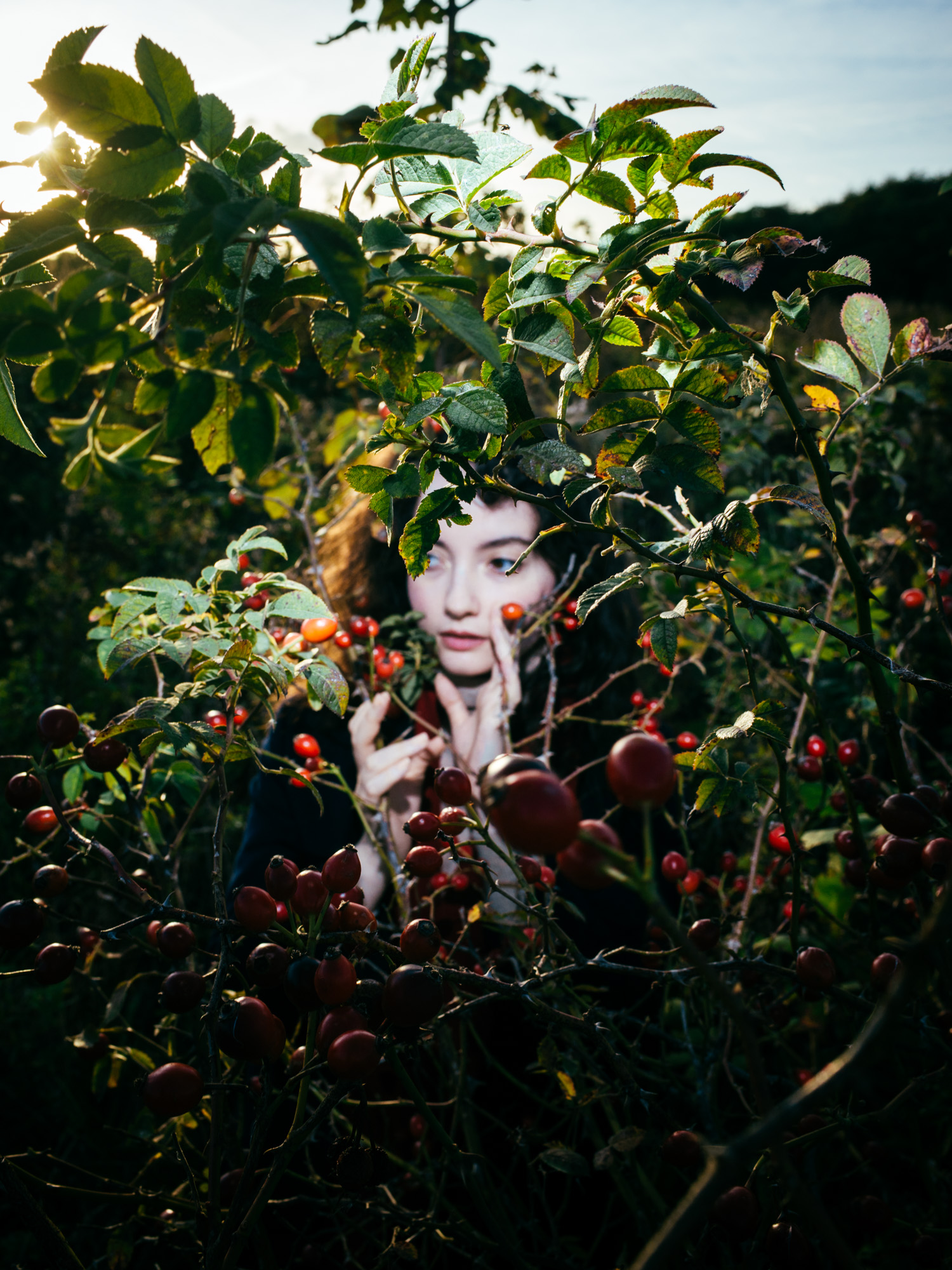 When “Fascination”, the first longplayer by the young artist Gloria de Oliveira, turned up last year, many were surprised by the album’s richness. Especially in music that seems to fit perfectly into the fashionable border area between synthie wave and a somnambulistic 4AD pop, it’s rather unlikely to find that many different layers of style and atmosphere. But even though “Fascination” definitely exudes the freshness of an debut, Gloria de Oliveira is anything but a newcomer. She already released most of the tracks on her album on two EPs before via her own label La Double Vie, besides these she ran the band project lovespells. But if her face or name seem familiar, it could also be – cue la double vie – due to her second mainstay in acting. Since 2012, she has played significant roles in feature films such as Ein Tag nach morgen, Strawberry Bubblegums and, most recently, in a modern take on the mythical tale of Undine; mostly, her portrayal of Tilly Brooks in the series Babylon Berlin attracted special attention. We also spoke to the artist about the benefits and challenges of having a wider range of creative interests.
When “Fascination”, the first longplayer by the young artist Gloria de Oliveira, turned up last year, many were surprised by the album’s richness. Especially in music that seems to fit perfectly into the fashionable border area between synthie wave and a somnambulistic 4AD pop, it’s rather unlikely to find that many different layers of style and atmosphere. But even though “Fascination” definitely exudes the freshness of an debut, Gloria de Oliveira is anything but a newcomer. She already released most of the tracks on her album on two EPs before via her own label La Double Vie, besides these she ran the band project lovespells. But if her face or name seem familiar, it could also be – cue la double vie – due to her second mainstay in acting. Since 2012, she has played significant roles in feature films such as Ein Tag nach morgen, Strawberry Bubblegums and, most recently, in a modern take on the mythical tale of Undine; mostly, her portrayal of Tilly Brooks in the series Babylon Berlin attracted special attention. We also spoke to the artist about the benefits and challenges of having a wider range of creative interests.
You studied mezzo-soprano and were initially interested in opera and classical singing. Then you devoted yourself more to your second pillar, which was acting and the medium of film. But at some point you returned to music, and now you can look back on some releases. How would you describe your career so far? Do you find detours and creative zigzag courses important to gain experience? Would your music be different without acting?
I think, like many young people at this stage, I simply lacked a certain amount of self-confidence after graduating from high school, to put it simply – which in part, as far as my professional path as well as personal life were concerned, pushed me in directions that ultimately didn’t quite suit me. But maybe I had to gather these experiences in order to devote myself more specifically to the things that turned out to truly be important to me. That’s why I don’t necessarily see it as a zigzag course, because everything builds on each other. I also see my creative output as a whole and even as a child I was interested in different media to realise my ideas and never questioned it – it was simply my natural approach. I see all this as synergetic.
Would you say that when it comes to music you are a bit closer to yourself, or is there sometimes a kind of role that you take on?
Yes, I would say that I am closer to myself in my music – even if, perhaps partly, as in my music videos, I take on a role – because at the end of the day, it’s me who came up with and assigned the respective role to myself.
Would you say that the – at least “alternative” – field of music is more spontaneous and free than working in the medium of film? How much can you organise your career as a singer independently?
Due to its nature, filmmaking cannot be spontaneous and free in most cases because it is tied to a machinery on which many people, institutions and conventions depend – not to mention the financial and organisational effort (of course there are some exceptions). Of course, music making can happen in a similarly expensive, elaborate and conventional way – but me and the musicians* in my circle of friends really appreciate our DIY freedom. My work as a musician has so far been quite independent and I quite like it that way, because in the film business and especially as an actress it is of course the opposite – to put it bluntly, one is dependent on getting offers in regard to artistic fulfillment and is also dependent on the timing of a large machinery. I have therefore consciously pursued my musical work very autonomously – but I am happy to get valuable support from my label (Reptile Music), my booking agency (Underground Institute) and my agent in the meantime, regarding releases, promotion, concert planning and so on. At the very beginning I did all this myself, which turned out to be a good learning experience on the one hand, but on the other hand takes up a lot of time and energy that I would rather put into other areas.
In an interview you once described yourself as delicately strung. Do you think that your interest in strong emotions and in partly morbid topics comes along?
I don’t actually perceive my interests as morbid – on the contrary, I am very interested in life and in the sheer sensation of being alive that comes with unhindered access to one’s own emotions.
How are your songs created? Do you sometimes improvise when you are in a certain mood?
I don’t really have a fixed approach – some songs are indeed created through improvisation, for example when I’m just messing around with new gear. Some songs come to me almost completely in my dreams – I always have to force myself to record them immediately by voice memo while still half asleep, so that the idea doesn’t vanish.
Are there any situations that inspire you in particular to write songs?
Life-altering and perhaps even traumatic events and phases are definitely the time when my output is at its highest. Maybe because music is the most immediate form of expression for me and supports me in these situations. Sounds corny and hackneyed, but I think there is something magical when something beautiful can emerge from a dark, perhaps destructive moment, like a song or an album that other people can enjoy. In fact, the messages from sad teenagers on the other side of the world that reach me on Instagram or via email are the absolute highlight of my musical work. The thought of making a small healing contribution to their everyday life motivates me a lot. I was once such a teenager myself and I still remember exactly what my favourite albums meant to me back then and how much they supported me morally.
Although your music is always melancholic, it never seems pessimistic or jaded. Maybe this is due to a kind of dreamlike element that is almost always present and comes across sometimes lovingly, sometimes playfully. Do you see that in a similar way?
I am definitely not a pessimistic or jaded person – and I am glad that you recognise playfulness in my music, because I am definitely very playful and silly. I don’t believe in coolness. I personally define “melancholy” as the joy that comes with indulging in a certain kind of sadness which makes you feel alive – see the answer to your question about strong emotions. Melancholy is life-affirming for me. I would clearly separate it from pessimism or cynicism – I consciously try not to become a cynical person even in the face of any adversity and I am happy to see this reflected in my music.
Some of your titles refer to films by Jean Rollin, and in videos like the one for “Dark Rider” you can clearly see his influence. How did you come across his films and was it a kind of love at first sight?
I must have come across him at some point as a teenager while surfing the net at night – I even believe through pictures of the two vampire sisters from “Lèvres de Sang”, which I immediately got stuck on and had to find out what they were all about. So yes, Fascination at first sight, so to speak – I recently read an article in which his films were described as “Daydreams for the witching hour”, that says it all.
In the years after Viol du Vampire his films were considered by many as amateurish genre films. The subtle surrealism of his pictorial language and the handwriting, partly reminiscent of Jacques Rivette, were not seen, nor was the fact that despite the sexualised horror motifs, the films never work with lurid effects. Later he became a cult director for some. What makes his films so special for you?
The sad vampire girls, crumbling castles, lost lovers, deserted beaches – the Rollin aesthetic is unmistakable and to me is characterised by a deep romanticism and a melancholy idealism. I also like the fact that Rollin seems like a loner in many respects – a filmmaker who had no concrete connection to the French cinema of the time, who broke with technical cinematic conventions and followed his own distinct visual style and thematic obsessions. I think it’s nice that Rollin has recently received the kind of attention that his works deserve, at least since the publication of the (highly recommended but sadly sold out) volume “Lost Girls: The Phantasmagorgical Cinema of Jean Rollin”, compiled by Samm Deighan – the book is a kind of correction for the years when men dominated the discussion about Rollin and his work. This aspect also led to my album and EP titles, which are named after Rollin’s films: The prevalent male gaze within his films and Rollin’s closeness to the sexploitation cinema of the time, coupled with his work as a porn director, is something I view very critically – which is why I am all the more interested in extracting those aspects of his work that excite me and placing them in a new, feminist context.
Are there any other works from film or literature that have had a significant influence on your own work?
Apart from films, series and soundtracks, poetry in particular has had a great influence on me – Anne Sexton, Sylvia Plath, John Keats, Rainer Maria Rilke, Guillaume Apollinaire and Else Lasker-Schüler are among my favourites. I have also “sampled” one or two verses from their poems in my song lyrics.
You even call the clip for “Dark Rider”, which you recorded with the Lovespells project, “a musical short film”. Does Lovespells still exist, or was it more of a temporary project?
The music I make under my own name follows no concept whatsoever and is very close to me personally – in contrast, Lovespells is a kind of experiment in which I wrap myself up in a persona, consciously pursue a certain aesthetic and in which Spampoets and I play with synth pop and dark wave conventions. There’s also a small Lovespells comeback in the form of a very danceable remix!
On “Fascination” there is a whole range of remixes – The Wide Eye, Tellavision, Box and the Twins, Fragrance. and last but not least Gudrun Gut. On The Wide Eye you have already returned the favor on “Forever”. How did these works come about, did you know each other before?
I only knew two of them personally before – firstly TELLAVISION, who like me studied at the HFBK and with whom I already collaborated for a music video. Secondly THE WIDE EYE, with whom I’ve been friends since I met him through Instagram a few years ago and with whom I’d like to work together often in the future.
A good remix certainly doesn’t depend on the remixer having a similar style or working method, often it’s the opposites that help, to get something unusual out of a song. You know that from both sides. What are the prerequisites for a good arrangement for you?
I don’t have any concrete prerequisites – except that I’m generally already a fan of the respective artists.. It was therefore such a pleasure to hear the interpretations of my tracks by these musicians* who are very much appreciated by me and I am very grateful that they were interested and inspired.
What musical ideas are you currently working on? Are there already new recordings?
Since the summer I have been working on material for a new album, which I would like to release next year. This time I’m carefully trying to break out of my usual isolation and I’m working with some people I really appreciate. Furthermore, me and my good friend ELKKS are working on further collaborations!
Interview: Uwe Schneider, Translation: N.Seckel
Fotos © Julia Ritschel und Beto Ruiz Alonso
Gloria de Oliveira @ Home, Youtube, Facebook, Instagram, Discogs & IMDB
